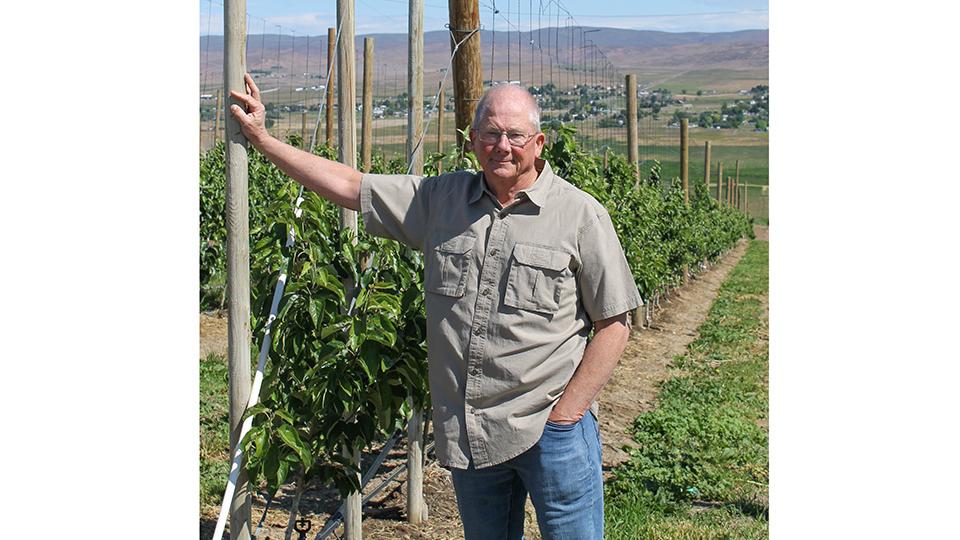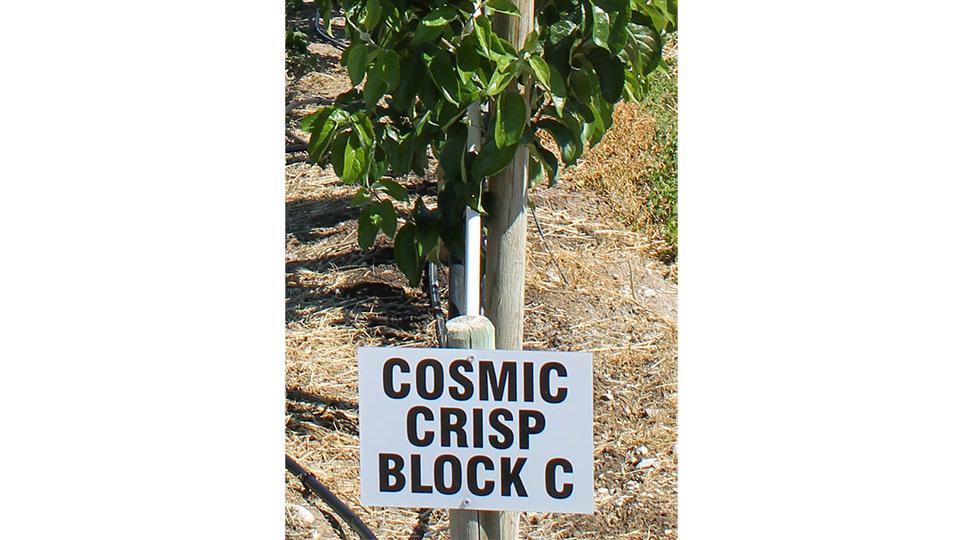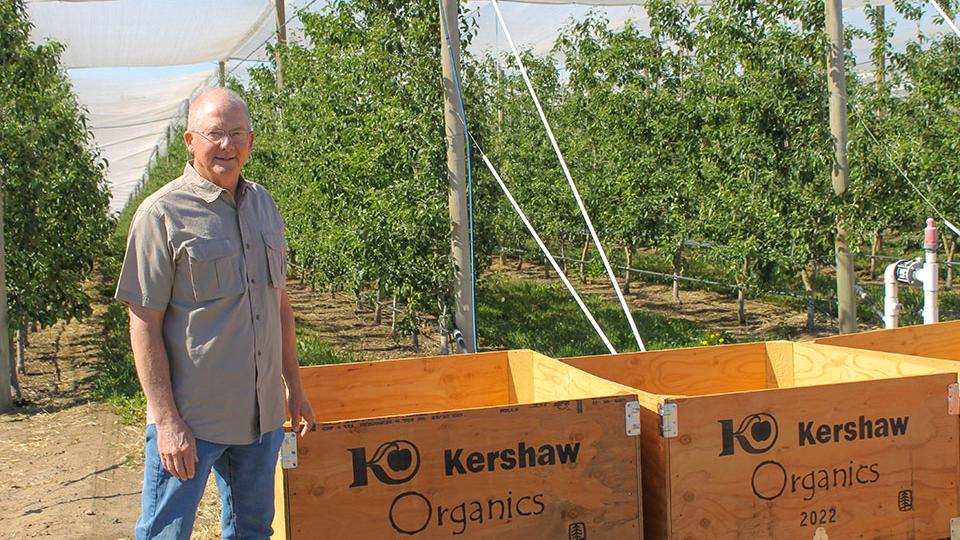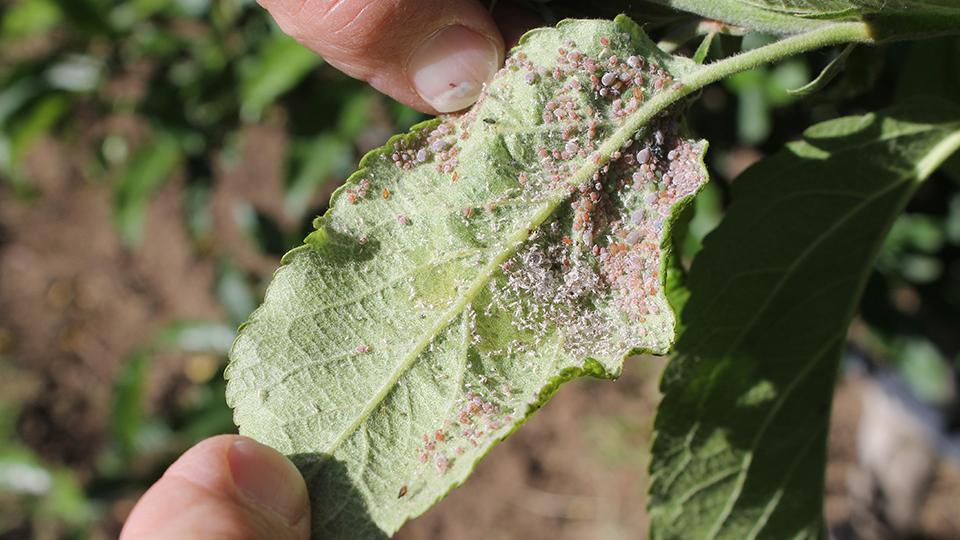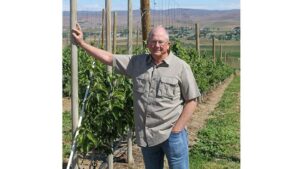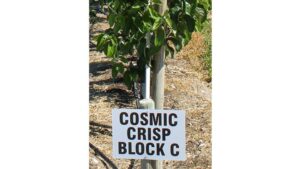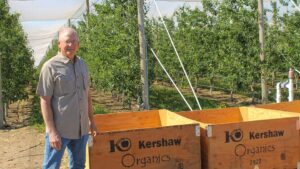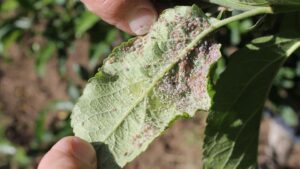Meet the 2022 Apple Grower of the Year Award Winner
Hang out with Dave Gleason on a typical Tuesday, cruising in his pickup through the irrigated desert in and around Yakima, WA, and you begin to learn why he’s often the guy growers invite to join them on panels at grower meetings to debate the thorniest problems.
His curiosity is boundless, stopping at one orchard and hopping out of his truck to check a tree that stands out. He turns over the leaf on a 5-year-old ‘Cosmic Crisp’ tree — the variety the state’s apple industry has largely staked its future upon — and finds some rosy apple aphids. But he’s not too concerned, as the pests are being held in check for now by lady beetles.
The veteran grower is now in his 60s and says he’s in the mentoring stage of his career, helping the fledgling leaders of tomorrow. Lunch that day was with just such a bright young grower, a young man who works for one of the large investment companies that moved into the state in a big way in recent years. But Tuesday morning coffee never changes, as Gleason meets with two retired horticulturists who have seen it all. Good teachers apparently never stop learning.
It was for his deep horticultural knowledge and for sharing it with his fellow growers that Dave Gleason is the 2022 American Fruit GrowerSM Apple Grower of the Year award recipient. Later this month, Dave will be accompanied by his wife Barbara, or “Babs” as she’s known, to formally accept the award, sponsored by Valent USA, at the U.S. Apple Association’s annual Apple Crop Outlook and Marketing Conference in Chicago.
PNW HAS IT ROUGH
Gleason is now Horticulturist/Proprietary Variety Developer at Kershaw Fruit, a division of Domex Superfresh Growers, one of a family of companies owned by the Kershaw family. Domex farms thousands of acres of apples, pears, cherries, and blueberries, though Gleason works only in apples. Domex is one of the largest apple growers in the state, he says.
It’s a state that has had some miserable growing weather the last few years, the topic that’s on the minds of virtually every fruit grower. Last year a freakish heat dome hit the Pacific Northwest, with temperatures exceeding 120 degrees. It was a nightmare for growers of soft fruits, berries, and cherries, but it wasn’t much better for apple growers. For example, many of the apple orchards in the state are on drip systems.
Such systems are great for orchard establishment and irrigation in routine years, but when growers run into a situation like last year, it doesn’t have any cooling effects, and heat units will decrease apple storability. ‘Gala’, in particular, has a proclivity for stem-cracking in the heat. And as the earliest major variety and the most widely grown variety in the state, it was a huge problem in 2021.
But this year it’s been terribly cool, and all the growers are talking about that with Gleason, how the fruit is delayed and lacks size. While temperatures in 2021 hit 100°F in May and as high as 120°F in June, this year the thermometer just barely got to 90°F at the end of June. In Okanogan County, an area known for its fruit production, a storm produced 3 to 5 inches of hail in 30 minutes.
RELATED CONTENT: A LOOK AT APPLE GROWER OF THE YEAR WINNERS 1989 to PRESENT
It’s good to have protection from hail, though ironically, it was the threat of sunburn that spurred Domex to use netting for all its new orchards, Gleason says. They provide numerous other benefits, primarily bird control and modifying the strong winds that blow in the afternoons. There are trade-offs, though, in that they have to deal with slower drying and delayed color development. Covering the orchard is also expensive, but Gleason notes, “The netting will be paid off by one big hailstorm.”
But you can’t keep fruit entirely protected. The weather of the last two seasons — besides the fluctuating temperatures, the state has been hit with odd, heavy downpours — has left growers wondering what’s next.
“This year there has been no heat — very unusual — while last year was crazy hot,” Gleason says. “It’s led to all sorts of problems.”
LIGHT OF THE SON
Gleason says such problems are not perhaps as difficult for him to manage as they could be. For that he thanks his father Russ, who grew up on a 40-acre apple farm — a typical size until about 50 years ago — and as an adult worked for a chemical company. He started his own grower consulting business in 1979, calling it “Sonlight Consultants,” which Gleason said was chosen because “Jesus is Son and the light of the world.” He kept the name because his faith is an important part of who he is and what he does.
“Things are unpredictable. You have to be alert to changes,” he says. “Being a Christian helps me keep an open mind about what’s in front of me, and when things get really difficult, I know God is in control.”
Gleason didn’t start out to be a grower. He went to Central Washington University and majored in German, with thoughts of becoming an international Bible translator. While that didn’t pan out, he minored in Spanish, which he uses almost constantly on the radio in his truck, talking to various farm supervisors.
Two years after graduating from college, he started working for his dad, eventually buying the business from him in 1995. About 20 years ago he began consulting for Kershaw Fruit, eventually going to work full-time for the company, managing all their orchards until 2018, when he began concentrating on variety development.
Russ Gleason died earlier this year at the age of 93. Russ was a pioneer in integrated pest management and an eternal student. He spent hours questioning the leading horticulturists and industry researchers. For instance, mites got to be a big problem in the 1960s, but Russ Gleason knew the answer didn’t lie in simply spraying, as he noticed the chemicals that were commonly sprayed often killed all the beneficial insects that would normally prey on the mites.
“He took a very soft approach — he was really ahead of his time,” Gleason says, who occasionally forgets his trusted advisor is gone. “I still think, ‘I should ask Dad about that.’ There was a lot of wisdom there.”
ORGANICS
For one thing, Gleason says his father really respected nature and was wise enough to know what was not natural. Take an organic orchard, for example.
Most orchards are not planted on virgin land, and converting them to organic does not mean returning them to nature. Many of the excellent orchard sites in the Yakima area have been producing apples off and on for more than a century.
“We are focused on regenerative approaches, how can we take what is there and improve it for the future,” Gleason explains. “The orchard is its own ecosystem.”
On average, growers can get a bonus for organic apples, but how much they get fluctuates, and prices have not been that great for a while in most varieties. ‘Honeycrisp’ is the exception, as it is easily the most popular variety and in high demand by the big retail chains. When you consider that, it’s an easy choice for growers to plant.
“It’s the only [variety] the market says we have to grow,” Gleason says.
However, it’s not the apple most visitors want to talk about, as that would be the aforementioned hoped-for industry mainstay, ‘Cosmic Crisp’. There are now more than 10 million trees in the ground in the state, the only state the Washington State University product can be grown, and Gleason takes solace in the fact it’s now perhaps the most studied variety in history.
It’s also a variety that does something that Gleason says he’s never seen before — it produces a crop load that is close to ideal most of the time. They don’t do any chemical thinning at all and, in fact, don’t do much hand-thinning.
However, now that he’s been working in variety development the past few years, it’s one of his own babies he wants to crow about, ‘Autumn Glory’. A ‘Golden Delicious’/’Fuji’ cross from Regal Fruit, the Domex proprietary variety has cider-like flavors of caramel and cinnamon that leave Gleason waxing poetic.
“It makes you think of autumn when you take a bite of apple pie — ‘Autumn Glory’,” he says. “Just making apple sauce, the whole house smells like apple pie. It’s just the nature of the apple.”




